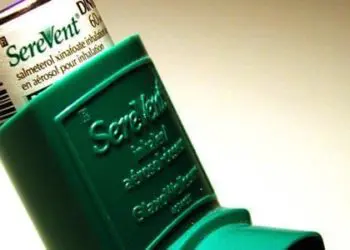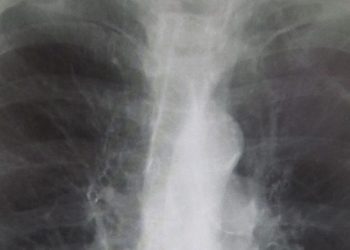Targeting Children’s Asthma Care measures reduced asthma readmission rates
1. Quality improvement (QI) initiatives targeting Children’s Asthma Care (CAC) measures reduced hospital readmission rates for asthma by 71% at 91 to 180 days post-discharge.
2. Post-discharge follow-up at a patient-centered medical home also increased significantly, from 69% to 90% attendance, following implementation of QI initiatives.
Evidence Rating Level: 2 (Good)
Study Rundown: Asthma is the most common chronic childhood disorder and asthma-related hospitalizations are a significant burden on the health care system. This study evaluated a quality improvement (QI) initiative at the Kapi’olani Medical Center for Women and Children in Hawaii that targeted Children’s Asthma Care (CAC) process measures. Inpatient CAC measures focus on clinical management (e.g. bronchodilator and corticosteroid use), while the outpatient component (CAC-3) focuses on follow-up at a patient-centered medical home (PCMH). CAC measures were targeted by implementation of inpatient automated order sets as well as pre-discharge scheduling of a PCMH follow-up appointment. Overall achievement of inpatient CAC measures was >99% throughout the study period and the CAC-3 compliance rate improved significantly during the study period (P < 0.001). ED utilization for asthma exacerbation did not vary, but hospital readmission rates were lower during the follow-up period. Overall, these results suggest that targeting CAC measures may reduce asthma hospital readmission rates and increase follow-up appointment attendance. This study is limited by a lack of control group, and these results represent only one hospital’s experience and may not be generalizable.
Click to read the study, published in Pediatrics
Relevant Reading: Follow-up after acute asthma episodes: what improves future outcomes?
Study Author, Dr. Lora Bergert, MD, talks to 2 Minute Medicine: Pediatric Hospitalist Division Head, Kapiolani Medical Center for Women and Children; Assistant Professor of Pediatrics, University of Hawaii.
“In the United States, pediatric asthma continues to be a leading cause of hospital admissions, with readmission rates between 10 percent and 40 percent. Our study looked at the development of a multidisciplinary Asthma Task Force focusing on the Children’s Asthma Care Measures (CAC) and incorporated tracking compliance with follow-up appointments with the patient-centered medical home. The study took place from January 2008 through June 2012 in children admitted with asthma. We achieved close to 100% compliance with all 3 CAC measures and showed improvement in compliance with their follow up appointments from 69% to 90%. We concluded that compliance with the asthma core measures and attendance at the post-discharge follow-up visit was associated with reduced hospital admission rates at 91 to 180 days post-discharge. These findings support the concept that continuity of care with the patient-centered medical home at hospital discharge is beneficial for children with asthma.”
In-Depth [outcomes study]: This study evaluated the success of a QI initiative at the Kapi’olani Medical Center for Women and Children in Hawaii targeting CAC outcome measures. Compliance to CAC measures was evaluated for all patients aged 2 to 18 admitted with asthma between January 1, 2008 and June 30, 2012, following implementation of the initiative. 231 children were discharged with asthma prior to the QI intervention and 532 patients were identified following the intervention. CAC outcomes measures for inpatient asthma care remained at >99% compliance throughout the study period, with no significant change following the intervention. Outpatient CAC measures, however, improved significantly during the study period, from an initial mean compliance of 74% to 95% (P < 0.001), with significantly improved follow-up rates at a PCMH from 69% attendance at the start of the study to 90% (P < 0.001). ED utilization for asthma exacerbation did not change following the intervention, however, re-admission rates were 71% lower in the 91 to 180-day range following discharge (OR: 0.29; 95% CI: 0.11–0.78).
More from this author: Seasonal increase in primary care visits for asthma, PCR associated with limited diagnostic utility in viral URI, Lower household income associated with higher pediatric inpatient costs, EHR useful for pediatric health insurance surveillance, Commercially purchased breast milk contaminated with pathogenic bacteria
Image: PD
©2012-2014 2minutemedicine.com. All rights reserved. No works may be reproduced without expressed written consent from 2minutemedicine.com. Disclaimer: We present factual information directly from peer reviewed medical journals. No post should be construed as medical advice and is not intended as such by the authors, editors, staff or by 2minutemedicine.com. PLEASE SEE A HEALTHCARE PROVIDER IN YOUR AREA IF YOU SEEK MEDICAL ADVICE OF ANY SORT.







